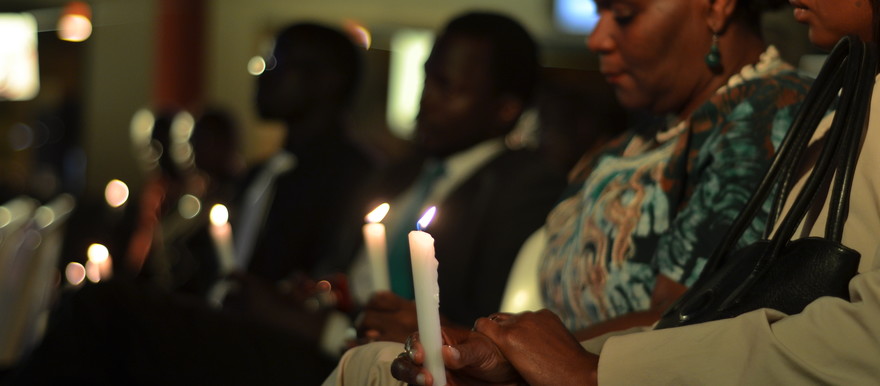South Sudanese remembered fellow citizens killed in their country’s civil war on Monday evening by reading out the names of the dead.
The event coincided with the first anniversary of the South Sudan Civil War, which began on December 15, 2013. The service, held in the courtyard of the National Museum in Nairobi, Kenya, was meant to memorialize the dead and to begin the process of reconciliation.
“Let’s start to heal, let’s reach out to one another,” said Pio Ding, a South Sudanese citizen who read the first set of names. “It’s painful, but there’s no other way out. We are not going to move away from each other, 62 ethnic groups.”
About fifty South Sudanese of different tribes and regions attended the memorial service. Just after sunset, they lit candles and prayed together before a procession of South Sudanese youth took turns reading the names of the dead.
Among the names read were people from many tribes and from every region in South Sudan. There were men, women, and children. Along with each name, the youth read the location of where the person died.
The youth read from a list of 572 names gathered by the “Naming The Ones We Lost” project. The project is an independent civil society initiative that is collecting names of everyone killed in the ongoing civil war.
“The list contains people of different professions, both civilians and military,” said Ding. “Those killed are traditional chiefs, doctors, and housewives, pastoralists, nurses, religious leaders, students, farmers, traders, men in uniform including UN peacekeepers.” The vast majority are civilians, he said.
The project’s organizers said the list is only a small fraction of the total because they have to go through extensive verification systems while documenting those killed.
Credible estimates of the number of South Sudanese killed in the civil war range from tens of thousands to up to 100,000.
The event brought out emotions of grief, loss, and anger. Some of the youth had to pause to wipe away tears when they came across names of their own relatives. The audience was quiet throughout, with individuals occasionally leaning over to relight their candles from their neighbor’s flame.
“I am traumatized,” said one tall young man simply before he began reading from the list.
Another youth chastised himself and his fellow South Sudanese for the deaths. “This is really a shame,” he said. “Here we are reading names of people we killed, and they are our brothers.”
Edmund Yakani, one of the event organizers, stressed that the project is neutral.
“This particular project it doesn’t have any political motives, and our advice to everybody who comes across this project: please, please, please we are begging you kindly don’t politicize, don’t politicize this initiative, this initiative doesn’t have any political motive,” he said.
“We have to remember the lives our own citizens who are innocent. They have nothing to do with the power. They have nothing to do with politics.”
Yakani urged civil society to work together to create a full memorial to all of those killed in the war.
View the full list of names here.
Those who wish to add their own loved ones to this list may do so by emailing to request a “Naming The Ones We Have Lost” form to namingtheoneslost@gmail.com




